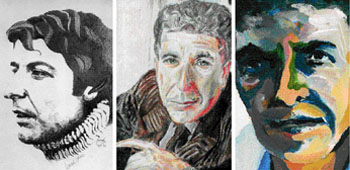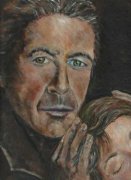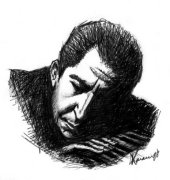At a Los Angeles carwash
in the summer of 1995, Leonard Cohen turned to me in the bright sunlight, raised
his sunglasses, and asked, "What about this Internet thing?" "What about it?"
I replied. We were sitting on two plastic chairs facing east, while his dark
green Pathfinder headed south through its wash and wax in preparation for our
journey up to Cohen's retreat at the Mt. Baldy Zen Center. In the heat, he pondered
aloud on the possibilities of worldwide access to his material. Should he allow
it? Who would look at it? What would be done with it? And who is that beautiful
woman getting out of her car? Though Cohen sensed the potential of the Net,
it was still a mystery that had little connection to his career. He was increasingly
dedicated to his new life outside the pop-music sphere, but he was equally determined
to avoid the fate so common to artists of his era. Some had vanished from sight
when they should have stuck around, while others kept coming back when they
should have bowed out gracefully. Cohen was considering an altogether different
route.
He had retired from performing
after his 1993 tour and headed to the mountaintop, but his fans wouldn't let
him escape. There were constant queries from the press. Followers speculated
on the next album or book. By the end of 1995, Cohen realized how to respond.
From Mt. Baldy, he had discovered the Leonard Cohen Files (www.leonardcohenfiles.com),
an Internet site run by a Finnish accountant and computer buff named Jarkko
Arjatsalo. Other fan sites had preceded it, of course, but none could match
its comprehensive scope, which included an on-line marketplace, a memorabilia
section, summaries of Cohen's books, and an interview archive.
While most other artists
will have little to do with sites dedicated to their work, Cohen decided to
give his stamp of approval - literally, his chop, a Chinese stamp, which
appears on the site - to the Cohen Files. In doing so, he turned Arjatsalo's
site into something perhaps unprecedented: a fan Web site that is the primary
venue for Cohen's new and unpublished poems, unrecorded song lyrics, and original
paintings, drawings, and sketches. Cohen himself posts these artifacts, and
now shapes the content of the site as much as Arjatsalo. Original work by Cohen
appears with regularity, including the preface he wrote to the recent Chinese
translation of Beautiful Losers. Penned in February, 2000, and titled,
"A Note to the Reader," the preface provides Cohen's latest thoughts on a novel
he calls an "odd collection of jazz riffs, pop-art jokes, refigured kitsch and
muffled prayer." The essay explains how he wrote the novel on the sunlit patio
of his home in Greece, never once wearing a hat, which makes the work, in his
words, "more of a sunstroke than a book."
Cohen has also posted one
of the first manuscript versions of "Suzanne," his most famous song, on the
site. He invites fans on a virtual tour of the Mt. Baldy Zen Center, including
a visit to his small apartment. Perhaps the site's most remarkable element is
a section where Cohen revised the lyrics to a new song, "A Thousand Kisses Deep,"
on-line, in real-time. For days, fans could view the updates to his verses until
finally, in the fall of 1998, he typed "Final Version."
Through the site, Cohen
the monk has become a cyber presence, his image, voice, and writing available
day and night. Leonardcohenfiles.com is an electronic notebook and bulletin
board used equally by Cohen and his fans, satisfying the "Cohenists," coupling
their desires with his work, and arguably keeping his career alive and vital.
The site assures his virtual existence, balancing his disappearance into the
spiritual world with an ongoing, on-line narrative of his comings and goings.
The technology suits his needs, being both personal and distant, and solves
his desire for privacy while giving his fans a controlled gateway to his life
and his work.
In many ways, the site
is the natural product of Cohen's connection to his fans, a relationship that
has changed almost as many times as his persona. Over the years, he has transformed
both his sound and his look, reshaping his sixties ballads into the Eurodisco
of the eighties - remember the danceable but haunting "I'm Your Man"? - and
discarding the early V-neck sweaters and chinos for the modern Leonard look
- dark glasses, dark suit, dark shirt. His relationship to his fans has evolved
similarly. Cohen went from lusting after them around the time of "Suzanne,"
to, with the Cohen Files, taking them into his confidence and giving them a
role in the creation and dissemination of his work.
As a result, his popularity
has grown in ways that his 1995 self would never have imagined. The site was
the first place to offer a detailed account of the 1995 album Tower of Song,
which featured cover versions of Cohen's work by Elton John, Sting, Billy Joel,
and others; and the announcement of his 1997 album, More Best of Leonard
Cohen, received instant worldwide publicity through the Cohen Files. Last
April, his latest poem, "The Correct Attitude," was posted exclusively on the
Web; by June 8, the site had registered its three-hundred-thousandth visitor.
How Cohenesque: he is simultaneously
here and not here, electronically available to his fans but also private and
elusive, travelling, writing, and recording. Like a verse from one of his songs
that returns hauntingly and then disappears, or one of his albums that's hidden
somewhere in the attic but not lost, Cohen hovers above his fans, guiding, shaping,
and revealing parts of himself: "Give me absolute control/ Over every living
soul/ And lie beside me, baby/ That's an order!"



![[PREV PAGE]](but-prev.gif)
![[NEXT PAGE]](but-next.gif)
![[INDEX PAGE]](but-ndx.gif)
![[SUB INDEX PAGE]](but-subi.gif)